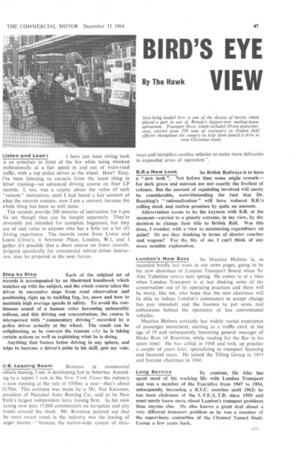BIRD'S EYE
Page 49

If you've noticed an error in this article please click here to report it so we can fix it.
By The Hawk VIEW
Seen being loaded here is one of the dozens of lorries which played a part in one of Britain's biggest-ever mailing-house operations. Transport fleets, which included 10-ton pantechnicons, carried some 558 tons of stationery to Oxfam field officers throughout the country to help them launch a drive to raise Christmas funds.
1 have just been sitting back yi an armchair in front of the are while being .whisked arofessionally at a fair speed in and out of main-road :raffle, with a top police driver at the wheel. How? Easy. I've been listening to extracts from the latest thing in lriver training—an advanced driving course on four LP records. 1, too, was a sceptic about the value if such
remote" instruction, until I had heard a fair amount of what the records contain; now I am a convert, because the whole thing has been so well done.
The records provide 200 minutes of instruction for 6 ens he set, though they can be bought separately. They're Dbviously not intended for complete beginners, but they are of real value to anyone who has a little (or a lot of) Iriving experience. The records come from Listen and Learn Library, 6 Seymour Place, London, W.1, and I gather it's possible that a short course on fewer records, Iesigned specifically for commercial vehicle driver instruc:ion, may be prepared in the near future.
Listen and Lear., Step by Step Each of the original set of records is accompanied by an illustrated handbook which matches up with the subject, and the whole course takes the driver in successive steps from road observation and positioning right up to tackling fog, ice, snow and how to maintain high average speeds in safety. To avoid the continuous sound of a human voice becoming unbearably tedious, and this driving out concentration, the course is interspersed with "commentary driving" recorded by a police driver actually at the wheel. The result can be enlightening, as he conveys the reasons why he is taking certain actions as well as explaining what he is doing.
Anything that fosters better driving in any sphere, and itelps to increase a driver's pride in his skill, gets my vote.
Leasing Boom Business in commercial vehicle leasing, I see, is developing fast in America. Accordlng to a report I saw in the New York Times the industry s now running at the rate of S500m. a year—that's about E170m. This estimate was made by a Mr. Nat katsman, president of National Auto Renting Co., said to be New York's largest independent lorry leasing firm. In his view easing now puts 17,000 commercials on turnpikes and city ;treets around the clock. Mr. Katsrnan pointed out that he most recent trend in the industry was the leasing of arger lorries-" because the nation-wide system of thru ways and turnpikes enables vehicles to make more deliveries in expanded areas of operation ".
B.R.s New Look So British Railways is to have
a "new look". Not before time some might remark— for dark green and maroon are not exactly the liveliest of colours. But the amount of repainting involved will surely be considerable, notwithstanding the fact that Dr. Beeching's rationalization" will have reduced B.It's rolling stock and station premises by quite an amount.
Abbreviation seems to be the keynote with B.R. at the moment—carried to a ghastly extreme, in my view, by the decision to change their title to British Rail. Was this done, I wonder, with a view to minimizing expenditure on paint? Or are they thinking in terms of shorter coaches and wagons? For the life of me I can't think of any, more sensible explanation.
London's New Boss So Maurice Holmes is, as
recorded briefly last week in our news pages, going to be the new chairman of London Transport Board when Sir Alec Valentine retires next spring. He comes in at a time when London Transport is at last shaking some of the conservatism out of its operating practices and there will be many, like me, who hope that the new chairman will be able to induce London's commuters to accept change (no pun intended) and the busmen to put some real enthusiasm behind the operation of less conventional vehicles.
Maurice Holmes certainly has widely varied experience of passenger movement, starting as a traffic clerk at the age of 19 and subsequently becoming general manager of Hicks Bros. of Braintree. while reading for the Bar in his spare time! He was called in 1948 and took up practice a couple of years later, specializing in transport licensing and financial cases. He joined the Tilling Group in 1955 and became chairman in 1960.
By contrast, Sir Alec has spent most or his working life with London Transport and was a member of the Executive from 1947 to 1954, subsequently becoming a B.T.C. member until 1962; he has been chairman of the L.T.F../L.T.B. since 1959 and must surely know more about London's transport problems than anyone else. He also knows a great deal about a very different transport problem as he was a member of the supervisory committee of the Channel Tunnel Study Croup a few years back.
Long Service
















































































































